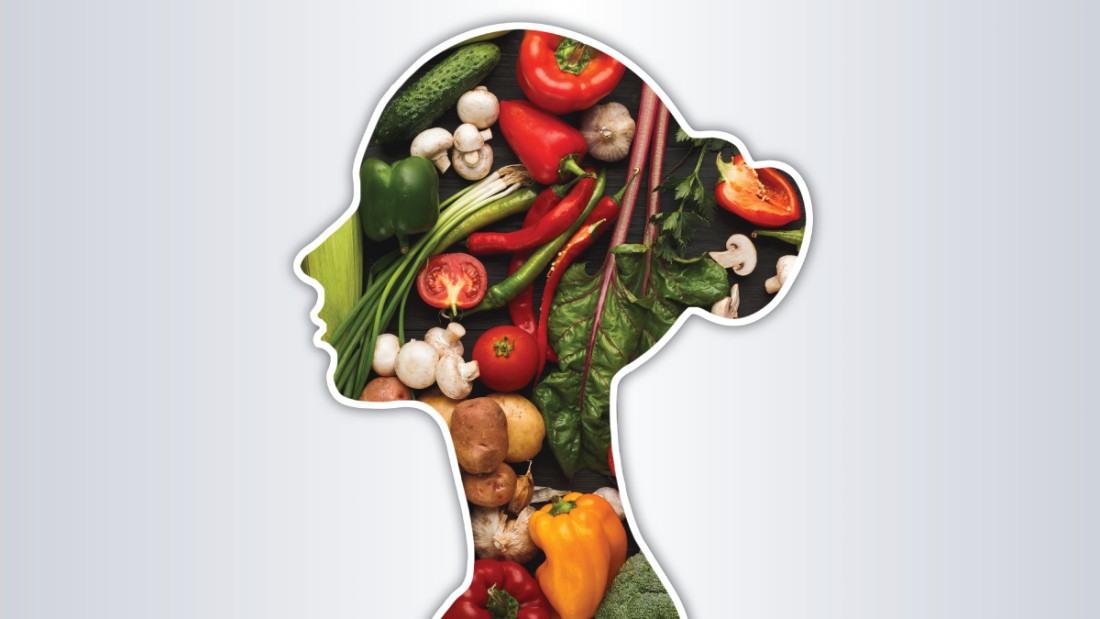The Ways Nutrition and Mental Health Interact
Written by: Daylan Wentland, MS, RD
Mental health challenges and considerations are becoming increasingly acceptable to talk about and seek treatment for. While many are familiar with therapy and medication as forms of treatment for mental health, did you know nutrition can also play a role in your brain’s ability to function at its best? This article will provide an introduction to the different ways that your mood may have an impact on your nutrition intake as well as how what you eat can impact how you feel emotionally.
Mood and Food
When we aren’t mentally feeling our best,
many areas of our lives can be impacted. We may find that we
isolate and withdraw socially, struggle to care for our
personal hygiene, and may want to sleep more or
struggle to sleep at all. We may notice fluctuations in
mood and energy, challenges concentrating, and trouble
meeting the demands of daily life. While various
symptoms may impact our school or work performance,
ability to connect with those who care about us, or the
way we spend our time, it is also very common to see
changes in the ways we interact with food.
A hallmark symptom of many mental health
challenges is a change in appetite. You may struggle to find food appetizing or food may feel like one of few comforts available when feeling distressed. Some see an increase in the amount of food they eat while others struggle to eat anything at all. Gastrointestinal (GI) concerns such as nausea, vomiting, diarrhea, or constipation can also be common symptoms. Treatment of mood symptoms with some medications can also cause an increase in GI symptoms, changes in we
ight, and changes in appetite.
Each of these differences cause a very direct effect on the amount of nutrition our body receives each day, but why? The answer lies in the connection between your GI system and your central nervous system, referred to as the gut-brain axis. Put simply, the way we think and feel can have an impact on our GI system’s ability to function and our GI system can also influence our brain. This is because our gut contains a large number of beneficial microorganisms that metabolize food
and create a variety of chemical compounds that send messages to the brain, affecting the way we feel. Additionally, the receptors that exist in the brain to receive neurotransmitters like serotonin and dopamine that influence our mood are also present in the gut and have a significant effect there. The presence of these receptors in our GI system is one of the reasons mental health medications have so many GI and appetite symptoms. These receptors can often also be the cause behind that “butterfly feeling” in your stomach when you
are excited or feeling sick when you’re nervous.

.
Food and Mood: While the previous section established some of the ways our mood can affect the nutrition we consume, food can also have an effect on how we feel. If we aren’t getting enough nutrition, or we have gaps in the kinds of nutrition our body does receive, we can often feel those effects in our brain. The brain has the largest energy requirement compared to every other organ in our body because it functions to maintain and coordinate all the body processes that keep us alive. On top of its high energy needs, the brain is also pretty picky about the energy it uses.
Our brains prefer glucose, a sugar obtained from breaking down carbohydrates in the various foods that we eat, as its primary fuel source. This means that when we don’t eat enough food overall, or enough carbohydrates, we directly feel that affect our brains. Some of the most common symptoms of hunger and under-fueling are felt in the way we think and feel mentally: brain fog, difficulty concentrating, headaches, increased irritability or feeling “hangry”, and thinking a lot about food. If we are chronically under-fueling ourselves, the mental and physical symptoms our brain influences become more uncomfortable: increased anxiety and depression symptoms, dizziness, lightheadedness, and potentially even passing out.
While our brain can cause uncomfortable symptoms when we aren’t getting enough carbohydrates to fuel it, it also influences our enjoyment of carbohydrate rich foods to encourage us to eat enough of them. There is a reason foods like pizza, potatoes, or pasta feel so desirable. Our brains need the nutrition they contain. When we eat carbohydrate rich foods, the levels of dopamine and serotonin in the body increase, reinforcing our desire to continue eating them and ensuring our brain is able to receive adequate amounts of energy.
Serotonin and dopamine also require adequate nutrition from the other macronutrients for our body to adequately synthesize and utilize them. Many of the hormones in our bodies are created from the fats and proteins that we get from the food we eat. Serotonin and dopamine are hormones specifically created from building blocks of protein, called amino acids, and are regulated or expressed based on the presence of cholesterol, a nutrient derived from fat. In other words, without adequate fat and protein from our diets, our neurotransmitters aren’t adequately created or used by our bodies.
Actionable Steps
As you can see, what we eat and how we feel are intricately connected. Understanding why our eating habits affect how we feel and how our moods affect our appetite and food choices can be easier than knowing how to put that information into practice. Listed below are some considerations and actionable steps you can take to support your mood through nutrition behaviors:
-
Eat enough each day: Eat multiple meals and snacks each day, including a mixture of at least 3 food groups at each meal and at least 2 food groups with each snack if you can (the food groups are: carbohydrates, protein, fat, dairy, and fruits/vegetables).
-
Eat consistently throughout the day: Spread your meals and snacks over the hours you are awake, trying to eat something every 3-4 hours rather than waiting until the end of the day to eat most of your food.
-
Vary your food choices: Try to eat a variety of foods from the different food groups with differing textures, colors, and tastes; variety improves both our satisfaction from eating and the kinds of nutrition we are receiving from meals.
-
Don’t ignore convenience: We all live busy lives! Make eating and food preparation easier by considering pre-cut, pre-cooked or quick to prepare options like frozen or delivered meals, pre-sliced fruit or frozen vegetable mixes, canned meat and beans, grab and go protein and snack bars, or boxed convenience foods.
-
Have a go-to meals list: Help current you prepare for future you and make a list of 5-10 simple, easy meals and snacks that are reliable for you and generally available for days when you just don’t have the energy or brain space to figure food out.
-
Consider booking a nutrition appointment: If these concepts were interesting to you, but you’d like additional assistance with applying them to yourself or would simply like to learn more, consider making a nutrition appointment. Contact our office today to schedule an evaluation to collaborate on the next steps toward improving you or your loved one’s relationship with food and their body.


